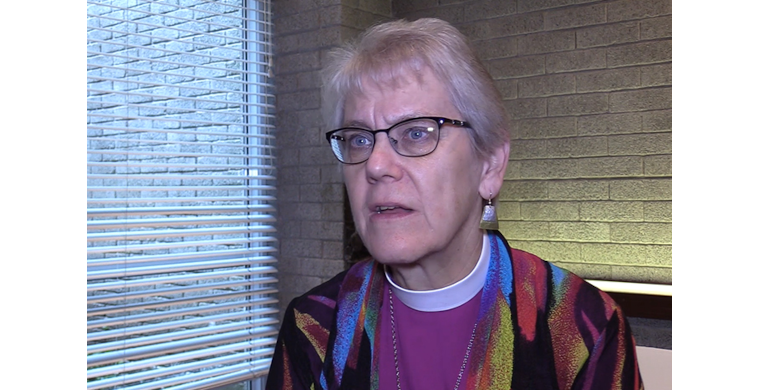ANGLICAN CHURCH OF CANADA ARCHBISHOP SUPPORTS ASSISTED SUICIDE
By David W. Virtue, DD
www.virtueonline.org
October 7, 2022
The Anglican Church of Canada's primate Linda Nicholls has come out in public support of assisted suicide, in violation of the sixth commandment "thou shalt not kill."
A report in the Anglican Journal said the church should continue to focus on providing pastoral care to people who are considering Medical Assistance in Dying (MAID), not on opposing the law, said Nicholls.
Bill C-7, passed in March 2021 opened up the option for patients whose deaths are not imminent--and, as of next March, the option for those suffering only from mental disorders--to seek MAID, attracting some controversy.
As the Journal reported, some advocates for the rights of people with disabilities have criticized it on the grounds that it offers death as a replacement for adequate care.
Two authors of In Sure and Certain Hope, a 2016 document offered as a resource for discussions around MAID, believe the bill raises questions which may require a new response from the church.
"But any new response by the church is unlikely to involve taking a public stance on the law," Nicholls says. "It's been clear for some time that the mood in Canada [is] not ... to consider what churches have to say about this," she says. "It's been seen as imposing Christian values--which I think is a little unfair, as I don't think all of the arguments have been based on a faith perspective."
Meanwhile, the shrinking staff of the church's national office has limited capacity to take on a question of this size, she adds, especially as the law, in her view, is a "fait accompli."
However, Charles Camosy, associate professor of theological and social ethics at Fordham University and author of the new book "Losing Our Dignity: How Secularized Medicine is Undermining Fundamental Human Equality," argues that assisted suicide poses a grave threat to the elderly and disabled.
He took aim at Canada and said, "Our neighbors to the north, have legalized physician-assisted killing, are accelerating their ride down the slope. Despite the objections of disability-rights organizations and First Nations leaders, communities disproportionately at risk for suicide, Canada recently opened up the practice to the disabled and mentally ill; deaths by this kind of suicide soared during the pandemic, with loneliness playing a major role."
He also pointed the finger at California where activists are trying to expand physician-assisted suicide to people with dementia. In Switzerland you can start with seemingly ironclad safeguards, such as "six months to live" or "hopeless and unbearable suffering" -- but soon enough, legalizing physician-assisted suicide opens the door to killing children who are too young to consent, victims of sexual abuse and even those who are simply "tired of life."
"That's the lesson of Europe's experience with assisted suicide and euthanasia, practices whose advocates are making quiet but expansive inroads in North America, as well.
"Oregon is the US state that has had this practice the longest, having legalized it in 1997. There, activists have no principled objection to expanding the range of people eligible. But they're sophisticated and want to avoid the public perception that supporting it necessarily leads to practices no one envisioned at the start.
"When Oregon tried to expand the practice from those with six months left to live to a year before death, people like Steve Telfer, president of Portland-based Death with Dignity National Center objected, arguing that it would send the wrong message to lawmakers considering similar laws in other states.
"The slide toward killing people with these kinds of disabilities isn't new, and it sadly represents a natural progression of our secularized, consumerist trajectory.
"If what we value primarily are productivity and autonomy, then the lives of human beings who lose their autonomy and become a net burden on others (and the state) are almost by definition of less or no value. With this in mind, it is perhaps less surprising to discover that physical pain and suffering don't make the top five reasons people request physician-assisted killing in Oregon -- it's the loss of autonomy that is the No. 1 reason for such requests."
Our "throwaway culture," as Pope Francis calls it, sets aside people with dementia in warehouses of death. Sedated, alone and kept "docile," millions suffering from this disease are already without the health resources their inherent dignity as human beings calls for. What will happen over the next generation, when this population doubles? Especially when those doing the very difficult work in our nursing homes can make more money at Walmart and McDonald's?
There are three options before us in the face of this problem, writes Camosy. "One is to ask physicians to simply directly kill this population -- a practice already well-advanced in the Netherlands. The second is to move toward so-called robot care: shifting the responsibility for those in senescence to artificial intelligence. But we still know on some level that machines can't "care" for others in any meaningful sense of that word.
"The better way is an all-hands-on-deck cultural recovery of fundamental human equality: one based not on productivity or autonomy, but on our sharing a common nature, which reflects the image and likeness of our creator. This means actively opposing a secularist culture that denies us the ability to explain how all living human beings are, in fact, equal in value.
"It is time for those of us with this theological understanding of the human person -- especially Christians, Jews and Muslims -- to stop capitulating to the false neutrality of secularism and actively defend and support those who are denied fundamental human equality. Our current trajectory has already been disastrous for many populations, unborn children and those with catastrophic brain injuries high among them.
"If we don't mobilize now in defense of the principle of fundamental human equality, people with dementia will be next."
For more on the subject click here: https://anglicanism.org/assisted-dying-theological-perspectives
END














